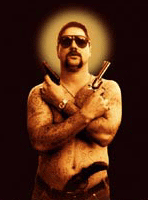 Chopper by Andrew Dominik, 2000.
Chopper by Andrew Dominik, 2000.Chopper is my first taste of Australian Cinema since I have arrived in Sydney. I, of course, have seen other Australian films in years past (Mad Max anyone?) but this is probably one of the only recent Australian features that I have had to the chance to see up unto this point.
Forging a path that crosses genres, Chopper manages to blend elements of the crime/gangster genre with a nice splash of black comedy. The film is about the real Chopper (Mark Brandon Read) who seems to feel that it is his responsibility to dole out justice. While there is some question to what crimes Chopper actually committed and what he made up for the sake of publicity, there is no doubt that Chopper is a hardened criminal through and through.
The film opens with him giving an interview on TV and intercuts this with Chopper watching the same special from his jail cell. Obviously proud of himself, Chopper grins from ear to ear at each moment he feels is particularly brilliant on his part.
It is from this point that the film jumps back in time and follows Chopper's story until it completes the circle of ending where the film began. It is here that the film, on a technical standpoint, falls a little short. It is sometimes difficult to tell if what you are viewing is in the present, past, or a particular spin on a event that Chopper is narrating. In many films this is a purposeful narrative choice, but in the case of this film I came away with the distinct feeling that temporal confusion was not the desired goal of the director.
What truly carries this film, and causes it to stand on its own in the recent deluge of gangster/criminal films is the character of Chopper and the absolutely superb performance turned in by Erik Bana. No matter how crazy, cruel, and volcanically violent Chopper can be you can't help but find yourself still liking the character on some level. Chopper is also the source of the very dark humor that permeates the entire narrative. After stabbing a fellow inmate brutally in the neck several times Chopper stands back, as if in shock at his own actions, and then asks the inmate, "Are you ok? You're ok, right mate," and then proceeds to light a cigarette and try to give it him. The humor is somewhat lost in the translation from screen to my brief description, but it is this type of awkward, inappropriately absurd politeness that manages to make even the most brutal scene comical in its execution.
I found the film to be a completely thrilling story, all the more engrossing due to its foundation in real life events. If you aren't squeamish, and are in the mood for a gritty yet funny piece of cinema consider Chopper.
***Three Stars

